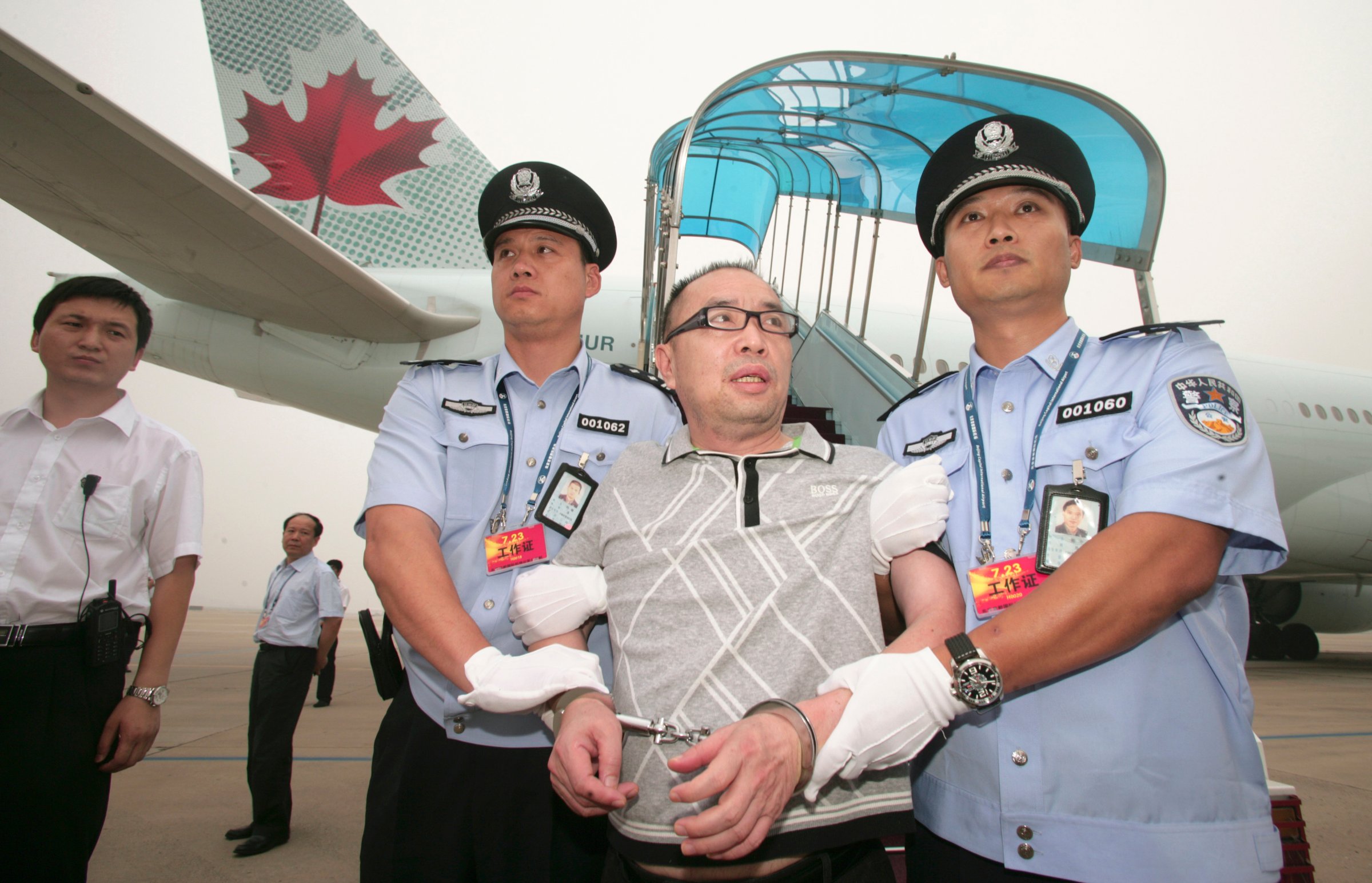
As Beijing intensified its blockbuster anticorruption campaign last year, Chinese authorities unveiled Sky Net, a crusade to nab the top 100 suspected financial fugitives who had allegedly fled overseas with their ill-gotten gains. Interpol was given the list of 100 names, and foreign governments were exhorted to help out. On Jan. 6, China’s top graft-fighting body publicized Sky Net’s success so far, since the program was launched last April: 19 individuals had been caught. Only 81 more to go.
On Wednesday, China’s Central Commission for Discipline Inspection (CCDI) also publicized its success in Operation Fox Hunt, a broader repatriation effort of Chinese criminal suspects. In the first 11 months of 2015, the CCDI reported, Chinese agents had returned 738 Chinese fugitives back home. But just how do these overseas Chinese end up back in the motherland? In November, China chartered four planes to Cambodia and Indonesia to pick up 254 Chinese who were suspected of participating in a phone and Internet fraud ring. China, though, has not signed extradition treaties with the U.S. or Australia, the two most favored destinations of Chinese on the run, according to the CCDI. The antigraft watchdog’s website explains that without such extradition agreements, “we have to use alternative measures, such as persuasion, repatriation and prosecution from another place, etc.”
Indeed, 41% of the 738 criminal suspects “were persuaded to return,” according to the CCDI, which did not elaborate on what persuasion techniques were employed. In November 2014, Xinmin Weekly, a magazine based in Shanghai, interviewed Li Gongjing, a Shanghai police officer involved in the Fox Hunt program. “My experience is that the effect of face-to-face persuasion and persuasion by telephone is totally different,” Li told Xinmin Weekly. “Although we talked by phone many times, this 20-minute face-to-face talk makes [a suspect] choose to return and confess.” Li also told Xinmin that he had once made a video of a female suspect’s case and mailed it to other suspects’ family members. “It’s very effective,” he was quoted as saying. “A suspect is like a kite. Although he is in a foreign country, his line is in China and we can find him through his relatives.”
A book written by a Fox Hunt agent last year described a “scrappy, full of passion” special-operations unit that braved everything from Ebola and equatorial heat to capture wayward Chinese. In Beijing’s Mirror Evening News, another agent breathlessly recounted how he induced Yang Huaiyuan, one of the Sky Net 100, to return to China from North America, in part by putting the businessman in touch with his elderly father who, over the phone, tearfully told his son to come home. He did.
The long arm of China’s law, though, may not always match local protocol or principle. In some cases, Fox Hunt agents have been accused of failing to consult adequately with local authorities, even if Beijing says it strives to hew to foreign laws. Even more concerning, some foreign governments have forcibly repatriated Chinese who are not considered serious criminals by local standards, potentially putting them at risk back home. In recent months, Chinese President Xi Jinping has escalated a crackdown on dissidents and other independent thinkers whose opinions diverge from the ruling Communist Party’s official line.
Last July, Thailand’s military government, in charge since a 2014 coup and committed to bettering relations with Beijing, deported around 100 Uighurs to China, even though human-rights groups and the U.S. government warned that members of the ethnically Turkic minority would face persecution back home. In a statement, the U.N. High Commissioner for Refugees (UNHCR) called the mass deportation “a flagrant violation of international law.” Violence has convulsed the Uighur homeland of Xinjiang, in China’s far west, and Beijing has blamed Muslim separatists for the bloodshed, which has killed hundreds.
In November, Thailand also sent a pair of veteran dissidents back to China, even though they possessed official refugee documents and were about to be resettled in a third country. The UNHCR again condemned the deportation in a statement. “This action by Thailand is clearly a serious disappointment,” said the U.N. agency, “and underscores the longstanding gap in Thai domestic law concerning ensuring appropriate treatment of persons with international protection needs.”
In October, Gui Minhai, a Chinese-born Swedish citizen who published salacious books about China’s leadership feuds and foibles, disappeared from his apartment compound in a Thai resort town. He has not been seen publicly since. Within days of Gui’s disappearance, three of his publishing colleagues also went missing while in southern China on separate trips. Then early this month, Gui’s business partner, Lee Bo, vanished from Hong Kong. A handwritten letter directed to Lee’s wife later claimed that the British passport holder had made his way to the mainland “using my own methods.” The faxed letter went on to say: “I am very well. Everything is fine.”
— With reporting by Yang Siqi / Beijing
More Must-Reads from TIME
- Cybersecurity Experts Are Sounding the Alarm on DOGE
- Meet the 2025 Women of the Year
- The Harsh Truth About Disability Inclusion
- Why Do More Young Adults Have Cancer?
- Colman Domingo Leads With Radical Love
- How to Get Better at Doing Things Alone
- Michelle Zauner Stares Down the Darkness
Contact us at letters@time.com